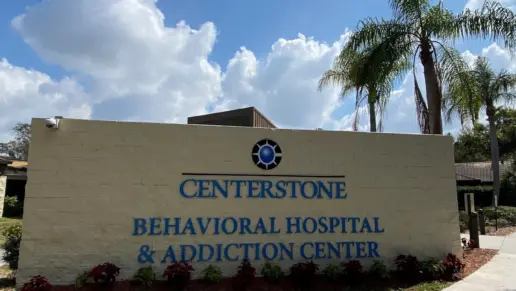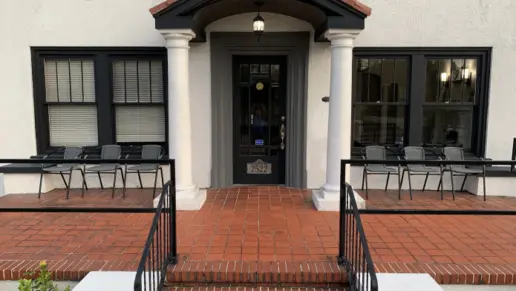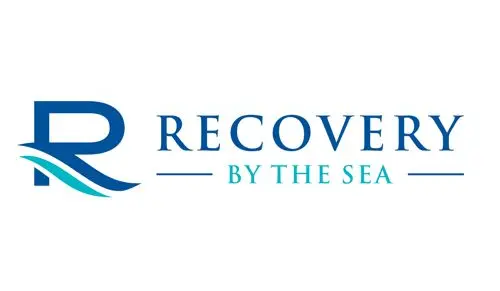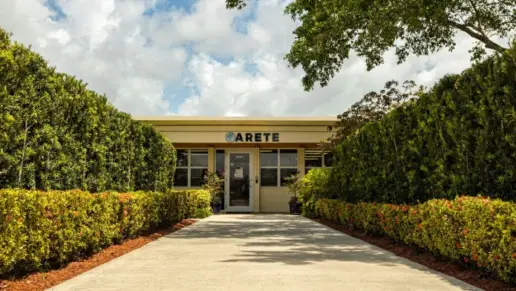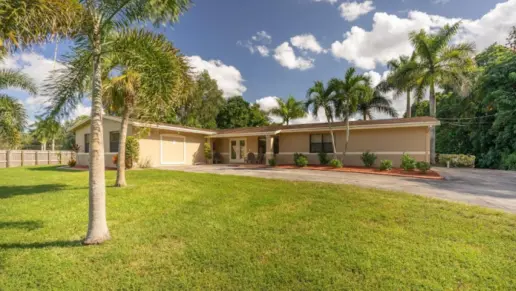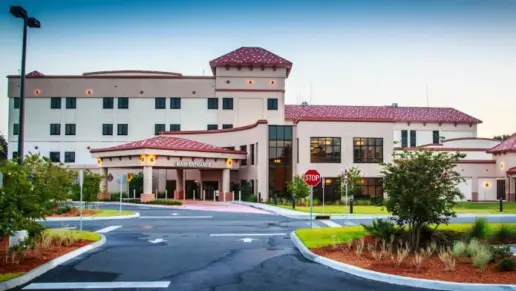About Grace’s Way Recovery
Grace’s Way Recovery in West Palm Beach, Florida, offered drug and alcohol treatment options intending to stop the cycle of relapse. They believed that sobriety was more than abstinence, and included becoming healthy overall. They did not think that relapse was an inevitable part of recovery and they worked hard to develop programs so you could prevent relapse before it happened.
In addition to addiction treatment for alcohol and drugs, they also offered treatment for co-occurring mental health conditions, also called dual diagnosis. Addressing these conditions simultaneously helped to increase the potential for successful treatment. Mental health conditions may include depression, anxiety, eating disorders, and borderline personality disorder.
This comprehensive care ensured you could live a healthy life after completing treatment. They also offered a family recovery program, partial hospitalization outpatient program, intensive outpatient program, and a relapse prevention program.
They used a whole family approach to address not only the needs of the person experiencing alcoholism or drug addiction but also their family members. In addition to treatment, you also had access to sober living residences for men and women to support your transition into the community.
Latest Reviews
Rehab Score
Accepted Insurance
Other Forms of Payment
Self-pay involves paying for treatment out of your own pocket. You can use savings or credit, get a personal loan, or receive help from family and friends to fund your treatment. If you don't have insurance or your insurance plan doesn't cover a specific program, self-pay can help ensure you still get the care you need.
Private insurance refers to any kind of healthcare coverage that isn't from the state or federal government. This includes individual and family plans offered by an employer or purchased from the Insurance Marketplace. Every plan will have different requirements and out of pocket costs so be sure to get the full details before you start treatment.
Sliding scale payments are based on a client's income and family size. The goal is to make treatment affordable to everyone. By taking these factors into account, addiction recovery care providers help ensure that your treatment does not become a financial burden to you or your family, eliminating one barrier to care.
Addiction Treatments
Levels of Care
 Intensive Outpatient
Intensive Outpatient
 Inpatient
Inpatient
 Aftercare Support
Aftercare Support
 Outpatient
Outpatient
 12-Step
12-Step
 Sober Living Homes
Sober Living Homes
Treatments
The goal of treatment for alcoholism is abstinence. Those with poor social support, poor motivation, or psychiatric disorders tend to relapse within a few years of treatment. For these people, success is measured by longer periods of abstinence, reduced use of alcohol, better health, and improved social functioning. Recovery and Maintenance are usually based on 12 step programs and AA meetings.
Drug rehab in Florida provides quality treatment to help individuals overcome dependency related to a wide range of addictive substances. Programs address both the physical and mental aspects of addiction in order to help you make a full recovery.
Opioid rehabs specialize in supporting those recovering from opioid addiction. They treat those suffering from addiction to illegal opioids like heroin, as well as prescription drugs like oxycodone. These centers typically combine both physical as well as mental and emotional support to help stop addiction. Physical support often includes medical detox and subsequent medical support (including medication), and mental support includes in-depth therapy to address the underlying causes of addiction.
Substance Abuse Treatment Centers focus on helping individuals recover from substance abuse, including alcohol and drug addiction (both illegal and prescription drugs). They often include the opportunity to engage in both individual as well as group therapy. At Grace’s Way Recovery, they offer a complete continuum of care, from the necessary medical detoxification process to partial hospitalization to outpatient addiction treatment.
Programs

Adult Program

Young Adult Program
Clinical Services
Cognitive Behavioral Therapy (CBT) is a therapy modality that focuses on the relationship between one's thoughts, feelings, and behaviors. It is used to establish and allow for healthy responses to thoughts and feelings (instead of unhealthy responses, like using drugs or alcohol). CBT has been proven effective for recovering addicts of all kinds, and is used to strengthen a patient's own self-awareness and ability to self-regulate. CBT allows individuals to monitor their own emotional state, become more adept at communicating with others, and manage stress without needing to engage in substance abuse.
Dialectical Behavior Therapy (DBT) is a modified form of Cognitive Behavioral Therapy (CBT), a treatment designed to help people understand and ultimately affect the relationship between their thoughts, feelings, and behaviors. DBT is often used for individuals who struggle with self-harm behaviors, such as self-mutilation (cutting) and suicidal thoughts, urges, or attempts. It has been proven clinically effective for those who struggle with out-of-control emotions and mental health illnesses like Borderline Personality Disorder.
Research clearly demonstrates that recovery is far more successful and sustainable when loved ones like family members participate in rehab and substance abuse treatment. Genetic factors may be at play when it comes to drug and alcohol addiction, as well as mental health issues. Family dynamics often play a critical role in addiction triggers, and if properly educated, family members can be a strong source of support when it comes to rehabilitation. The Family Recovery Program is one of the most crucial aspects of what they do at Grace’s Way Recovery. Research in the field of addiction treatment clearly supports the idea that working with the patient AND the family promotes long-term sobriety. Drug and alcohol addiction is a family system disease and family members are always deeply impacted by a loved one abusing drugs or alcohol.
Group therapy is any therapeutic work that happens in a group (not one-on-one). There are a number of different group therapy modalities, including support groups, experiential therapy, psycho-education, and more. Group therapy involves treatment as well as processing interaction between group members.
In individual therapy, a patient meets one-on-one with a trained psychologist or counselor. Therapy is a pivotal part of effective substance abuse treatment, as it often covers root causes of addiction, including challenges faced by the patient in their social, family, and work/school life. Styles of individual therapy at Grace’s Way Recovery incorporate evidence-based, proven methods of care that truly help patients to learn how to live healthy, sober lives. Patients may experience a variety of therapeutic techniques while being treated at Grace’s way.
Life skills trainings involve all the skills a person must have in order to function successfully in the world. These include time management, career guidance, money management, and effective communication. Truly successful addiction recovery is based on the ability to not only live substance-free, but to thrive. Life skills teaches the practical necessities of functioning in society, which sets clients up for success in life, and therefore sobriety.
Nutrition therapy, aka medical nutrition therapy (MNT), is a way of treating physical, emotional, and medical conditions through diet. Specific dietary plans are designed by professional nutritionists or registered dietitians, and patients follow them in order to positively affect their physical and mental health. At Grace’s Way, they offer nutritional counseling that teaches patients to eat healthfully while sticking to a realistic budget that matches their lifestyle. Their program of recovery is extremely thorough, and they have expertly integrated nutrition education in a way that is both relatable and exciting for their patients. Their nutrition counselors, like the rest of the clinical staff at Grace’s Way Recovery, are dedicated to helping patients achieve holistic well-being and lifelong recovery from drug and alcohol addiction.
Trauma therapy addresses traumatic incidents from a client's past that are likely affecting their present-day experience. Trauma is often one of the primary triggers and potential causes of addiction, and can stem from child sexual abuse, domestic violence, having a parent with a mental illness, losing one or both parents at a young age, teenage or adult sexual assault, or any number of other factors. The purpose of trauma therapy is to allow a patient to process trauma and move through and past it, with the help of trained and compassionate mental health professionals. At Grace’s Way Recovery, they believe that everyone has the right to live a life free of emotional and physical distress in sobriety. Their therapists are licensed and experienced in helping patients to work through early childhood and adult originated trauma through a variety of therapeutic methods. When clients enroll at Grace’s Way Recovery, they will complete an intake assessment that will help their clinical staff to create an individualized, comprehensive treatment plan. Clients will be immersed in a supportive environment with other recovering individuals who can relate to their experiences in active addiction, and who will support them on their journey towards freedom from substance dependence.
Amenities
-
Private Setting
-
Yoga Studio


